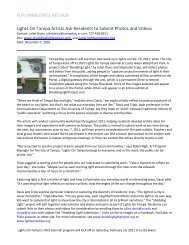Roland Barthes â Mythologies - soundenvironments
Roland Barthes â Mythologies - soundenvironments
Roland Barthes â Mythologies - soundenvironments
You also want an ePaper? Increase the reach of your titles
YUMPU automatically turns print PDFs into web optimized ePapers that Google loves.
PlasticDespite having names of Greek shepherds (Polystyrene, Polyvinyl,Polyethylene), plastic, the products of which have just beengathered in an exhibition, is in essence the stuff of alchemy. At theentrance of the stand, the public waits in a long queue in order towitness the accomplishment of the magical operation parexcellence: the transmutation of matter. An ideally-shapedmachine, tubulated and oblong (a shape well suited to suggest thesecret of an itinerary) effortlessly draws, out of a heap of greenishcrystals, shiny and fluted dressing-room tidies. At one end, raw,telluric matter, at the other, the finished, human object; andbetween these two extremes, nothing; nothing but a transit, hardlywatched over by an attendant in a cloth cap, half-god, half-robot.So, more than a substance, plastic is the very idea of its infinitetransformation; as its everyday name indicates, it is ubiquity madevisible. And it is this, in fact, which makes it a miraculoussubstance: a miracle is always a sudden transformation of nature.Plastic remains impregnated throughout with this wonder: it is lessa thing than the trace of a movement.And as the movement here is almost infinite, transforming theoriginal crystals into a multitude of more and more startlingobjects, plastic is, all told, a spectacle to be deciphered: the veryspectacle of its end-products. At the sight of each terminal form(suitcase, brush, car-body, toy, fabric, tube, basin or paper), themind does not cease from considering the original matter as anenigma. This is because the quick-change artistry of plastic isabsolute: it can become buckets as well as jewels. Hence aperpetual amazement, the reverie of man at the sight of theproliferating forms of matter, and the connections he detectsbetween the singular of the origin and the plural of the effects. Andthis amazement is a pleasurable one, since the scope of thetransformations gives man the measure of his power, and since the97very itinerary of plastic gives him the euphoria of a prestigiousfree-wheeling through Nature.But the price to be paid for this success is that plastic, sublimatedas movement, hardly exists as substance. Its reality is a negativeone: neither hard nor deep, it must be content with a 'substantial'attribute which is neutral in spite of its utilitarian advantages:resistance, a state which merely means an absence of yielding. Inthe hierarchy of the major poetic substances, it figures as adisgraced material, lost between the effusiveness of rubber and theflat hardness of metal; it embodies none of the genuine produce ofthe mineral world: foam, fibres, strata. It is a 'shaped' substance:whatever its final state, plastic keeps a flocculent appearance,something opaque, creamy and curdled, something powerless everto achieve the triumphant smoothness of Nature. But what bestreveals it for what it is is the sound it gives, at once hollow andflat; its noise is its undoing, as are its colours, for it seems capableof retaining only the most chemicallooking ones. Of yellow, redand green, it keeps only the aggressive quality, and uses them asmere names, being able to display only concepts of colours.The fashion for plastic highlights an evolution in the myth of'imitation' materials. It is well known that their use is historicallybourgeois in origin (the first vestimentary postiches date back tothe rise of capitalism). But until now imitation materials havealways indicated pretension, they belonged to the world ofappearances, not to that of actual use; they aimed at reproducingcheaply the rarest substances, diamonds, silk, feathers, furs, silver,all the luxurious brilliance of the world. Plastic has climbed down,it is a household material. It is the first magical substance whichconsents to be prosaic. But it is precisely because this prosaiccharacter is a triumphant reason for its existence: for the first time,artifice aims at something common, not rare. And as an immediateronsequence, the age-old function of nature is modified: it is nolonger the Idea, the pure Substance to be regained or imitated: anartificial Matter, more bountiful than all the natural deposits, isabout to replace her, and to determine the very invention of forms.A luxurious object is still of this earth, it still recalls, albeit in a98




